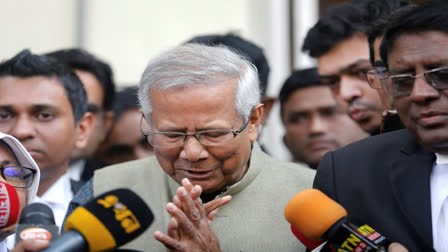New Delhi: With reports suggesting that Muhammad Yunus has accepted requests to act as the chief advisor of an interim government in Bangladesh following the ouster of Prime Minister Sheikh Hasina following a dramatic series of developments on Monday, India will heave a sigh of relief, albeit for a short time.
An economist and banker by profession, Yunus was seen as a threat by the Hasina dispensation after he reportedly professed an interest in entering politics way back in 2007 when an interim government was in charge ahead of a parliamentary election. The election eventually saw Hasina coming back to power.
Though Yunus, founder of the Grameen Bank, eventually decided not to foray into politics, there was a lasting suspicion within the Hasina administration about his intentions in Bangladesh politics. His influence and support from the international community posed a challenge to the political establishment.
The Grameen Bank is a highly influential institution in Bangladesh, providing financial services to millions of poor individuals. The government, under Hasina, sought greater control over the bank, which led to conflicts with Yunus. In 2011, Yunus was removed from his position as managing director of Grameen Bank on the grounds that he had exceeded the mandatory retirement age. This move was widely seen as politically motivated and aimed at diminishing his influence.
The government accused Yunus of financial mismanagement and diversion of funds, although these claims were largely discredited by international investigations. Nonetheless, these accusations were used to tarnish his reputation. Yunus and his associates faced numerous legal challenges and regulatory pressures, including investigations by the National Board of Revenue and the Anti-Corruption Commission. These actions were perceived as attempts to intimidate and discredit him.
Yunus's persecution attracted significant international attention and criticism. Prominent global figures, including former US Secretary of State Hillary Clinton and Nobel laureates, have voiced their support for Yunus, which further strained his relationship with the Hasina dispensation.
The government's actions against Yunus also reflect a broader trend of restricting civil society organisations and limiting their influence. Grameen Bank's independent stature and Yunus's global connections were viewed as challenges to state authority.
The persecution of Yunus strained Bangladesh's diplomatic relations with several Western countries and international organisations. The backlash from the global community highlighted the broader implications of the government's actions on Bangladesh's international standing. However, despite all this, Yunus has had a multifaceted relationship with India. His influence and interactions span various sectors, including economic development, social entrepreneurship, and education.
"People in Bangladesh love Yunus," Bangladeshi academic and social activist Sharin Shajahan Naomi told ETV Bharat. "They will love a new face in power. If Yunus takes charge, India and Russia will not mind. He is the most transparent person as of now. He is liked by all superpowers."
